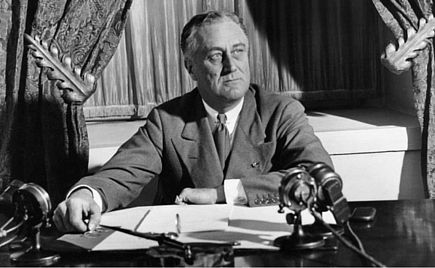FDR’s first fireside chat: the banking crisis

On April 12, 1945, the country seemed to stop when President Franklin D. Roosevelt died. FDR had been in office since 1933, and for many young people, he was the only president they had ever known.
Early in his first year, Roosevelt faced one of the country’s biggest economic challenges: the Great Depression, and linked to that, the Banking Crisis. In response to the economic depression, people rushed to their banks and asked to get their money out. More than half of the country’s banks had either gone bankrupt or suspended any withdrawals.
The day he entered office on March 4, 1933, President Roosevelt declared a banking holiday for March 6. During this holiday, Federal auditors went over the books to determine which banks were sound and could reopen. Also, Congress passed the Emergency Bank Act in a special session, giving the president the power to reopen financially-secure banks.
Then, on March 12, the day before the holiday was slated to end, Roosevelt made the banking crisis the subject of his first fireside chat. Using the new medium of radio to talk directly to the American people in his own voice, Roosevelt sought to build trust by explaining the crisis itself as well as the logic behind his actions. By the end of his 11 years in office, Roosevelt had delivered 30 such chats, building a unique connection to the American people during frightening and uncertain times.
What many forget about the banking crisis, however, was that President Hoover approached President-elect Roosevelt about issuing a joint statement on a bank holiday. Roosevelt refused to cooperate, making sure the he and the Democrats would get the credit.